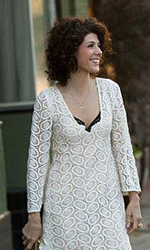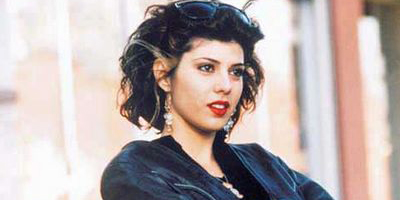Take Three: Marisa Tomei
 Sunday, March 6, 2011 at 3:26PM
Sunday, March 6, 2011 at 3:26PM Craig here with the start of the second season of Take Three. Today: Marisa Tomei

Take One: Cyrus (2010)
Tomei is a pure delight in last year’s Cyrus. Her performance demonstrated yet again that great comic turns sometimes pass awards bodies by. But one Oscar win (for My Cousin Vinny, see below) and two other nominations ain’t too shabby. In Cyrus Tomei, at this glorious mid-stage in her career, showed her peers how unblemished by cliché a modern, mature romantic woman should be played. She’s tried more conventional rom-com roles previously – What Women Want, Only You, Someone Like You – but here, with an unstudied attractiveness, she succeeds where others often fail.

There’s no It’s Complicated-style pandering to "maturity" nor feebly vacuous youthful platitudes to her character Molly, a single mother of awkward teen Jonah Hill. She treads finely between One Hot Mama and motherly protection. Her karaoke assistance for drunken John C. Reilly on the Human League’s "Don’t You Want Me Baby" is a miniature, playfully daft act of mature solidarity. But Tomei’s always been good at making her characters feel fully-functional within mere minutes of screen time. She's still a vibrant comic tonic, but now the swig is sweeter for being long-practiced. She looks and performs better than ever in Cyrus. It's a wonderfully carefree performance.
Take Two: My Cousin Vinny (1992)
In this hit comedy, she's Mona Lisa Vito, an attorney’s moll in rural hell. She’s far from the small-time Brooklyn she knows – as evidenced by her array of designer outfits loud enough to set off car alarms. She’s the eventual key, surprise witness in the trial Joe Pesci’s fudging his way to success on, her recollection of extensive automotive trivia saves The Karate Kid and his chum from death row. Fancy that. She pulls a Mona Lisa sneer from the time she enters small town Alabama and communicates her twenty-four hour indignation with a comically-unamused authoritative pout. More often than not she takes the top spot on Vinny’s comedy scoreboard and ends up owning the film outright.

This early role thrust an Oscar (Supporting Actress ’92) in Tomei's lap. Her career went into the stratosphere, quite briefly, before it went into the stratobscure. The sound of the words ‘Wrong Name Read Out’ and ‘Undeserved Oscar’ surely rang in her ears. How unfair to her solidly good supporting turn was that? So boo-hiss-boo to the naysayers. Several performance highlights stand out – bailing Pesci out of jail, the argument over a dripping faucet, her “biological clock ticking” veranda foot stamp – but it’s her delightfully knowing, sass-filled sarcasm that’s most memorable. That and her staunch refusal to do anything other than play her and Pesci’s relationship problems out on the stand for all to bear witness to. She’s the film’s treasure so it's fitting that she was rewarded with (Oscar) gold.
Take Three: The Wrestler (2008)
If it wasn’t enough that Tomei had to snog Joe Pesci in Vinny all those years ago, she had to lock lips with Mickey Rourke in The Wrestler for her sins. Add in Reilly in Cyrus and William H. Macy in Wild Hogs and it seems Tomei gets landed often with the, er, more unconventional leading men. In The Wrestler she plays Pam (stage name: Cassidy), the New Jersey stripper worried about her age in relation to her profession. She befriends Rourke's title character for sensual healing and emotional solace. Romancing a heavily surgery-augmented co-star is one thing, but she appeared fitfully deflated on screen. Ever the acute professional, Tomei smartly extinguished her usual inner spark to play the weary part.The Wrestler was the film that nabbed her a third Oscar nomination. (The second was for In the Bedroom in 2002.)

Cassidy’s life, like Randy's, is a sad song half sung. She's his tender yet damaged flipside, just with baying, paying hecklers flinging dollar bills instead of barb-wired deckchairs. Both lived on the periphery of normal society, just holding on to the tattered coattails of the American Dream. The attentive regard she shows Randy – which Tomei cleverly conveys through minute actions and a gentle, knowing expressiveness – speaks volumes about who Pam is and why she shouldn’t ever be fully consumed by “Cassidy”. The control Tomei exerts in the film is almost invisible. She’s a consummate professional and Pam/Cassidy is a supporting performance of the highest order.
Three more key roles for the taking: Chaplin (1992), The Perez Family (1995), In the Bedroom (2001)
 Cyrus,
Cyrus,  Marisa Tomei,
Marisa Tomei,  My Cousin Vinny,
My Cousin Vinny,  Take Three,
Take Three,  The Wrestler
The Wrestler 

